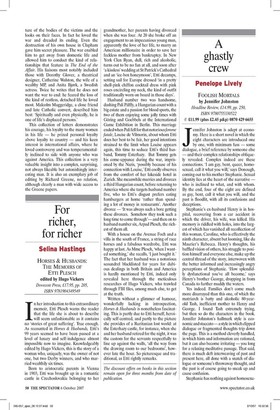For richer, for richer
Selina Hastings HORSES & HUSBANDS: THE MEMOIRS OF ETTI PLESCH edited by Hugo Vickers Dovecote Press, £17.95, pp. 205, ISBN 9781904349549 1 n her introduction to this extraordinary memoir, Etti Plesch warns the reader that the life she is about to describe will seem unfashionable as it contains no 'stories of great suffering'. True enough. As recounted in Horses & Husbands, Etti's 99 years seemed to have been passed at a level of luxury and self-indulgence almost impossible now to imagine. Knowledgeably edited by Hugo Vickers, this is the story of a woman who, uniquely, was the owner of not one, but two Derby winners, and who married wealthily six times.
Born to aristocratic parents in Vienna in 1903, Etti was brought up in a romantic castle in Czechoslovakia belonging to her grandmother, her parents having divorced when she was four. At 20 she broke off an engagement to an impecunious young man, apparently the love of her life, to marry an American millionaire in order to save her feckless mother from bankruptcy. In New York Clen Ryan, dull, rich and alcoholic, turns out to be no fun at all, and soon after 'a kissless' wedding at St Patrick's Cathedral and an `ice-box honeymoon', Etti decamps, setting sail for Europe dressed 'in a pretty shell-pink chiffon cocktail dress with pink roses encircling my neck, the kind of outfit traditionally worn on board in those days'.
Husband number two was handsome, dashing Pali Palffy, a Hungarian count with a big estate and a passion for blood sports, the two of them enjoying some jolly times with Goring and Goebbels at the International Game Exhibition in Berlin. This marriage ended when Pali fell for that notoriousfemme fatale, Louise de Vilmorin, about whom Etti does her best to be fair, her good intentions strained to the limit when Louise appears again, this time to seduce Etti's third husband, Tommy Esterhazy. But Tommy gets his come-uppance during the war, imprisoned by the Nazis, 'possibly because of his connection with Louise,' Etti coolly observes from the comfort of her lakeside hotel in Zurich. She meanwhile marries and divorces a third Hungarian count, before returning to America where she targets husband number five, who to Etti's disgust prefers eating hamburgers at home 'rather than spending a lot of money in restaurants'. Another divorce — 'It was always such a bore getting these divorces. Somehow they took such a long time to come through'— and then on to husband number six, Arpad Plesch, the richest of them all.
With a house on the Avenue Foch and a villa in the south of France, a string of race horses and a fabulous wardrobe, Etti was happy at last. As Mme Plesch, 'when I wanted something,' she recalls, 'I just bought it.' The fact that her husband was a notorious scoundrel blacklisted for years for dubious dealings in both Britain and America is hardly mentioned by Etti, indeed only revealed here through the meticulous researches of Hugo Vickers, who trawled through FBI files, among much else, to get at the truth.
Written without a glimmer of humour, wonderfully lacking in introspection, Horses & Husbands is nonetheless fascinating. This is partly due to Etti herself, heroically self-centred, and partly to the picture she provides of a Ruritanian lost world: at the Esterhazy castle, for instance, when she and her husband retired for the night, it was the custom for the servants respectfully to line up against the walls, 'all the way from the drawing room to our bedrooms', however late the hour. So picturesque and traditional, as Etti rightly remarks.
The discount offers on books in this section remain open for three months from date of publication.





























































 Previous page
Previous page